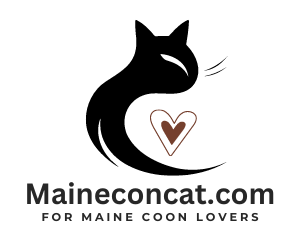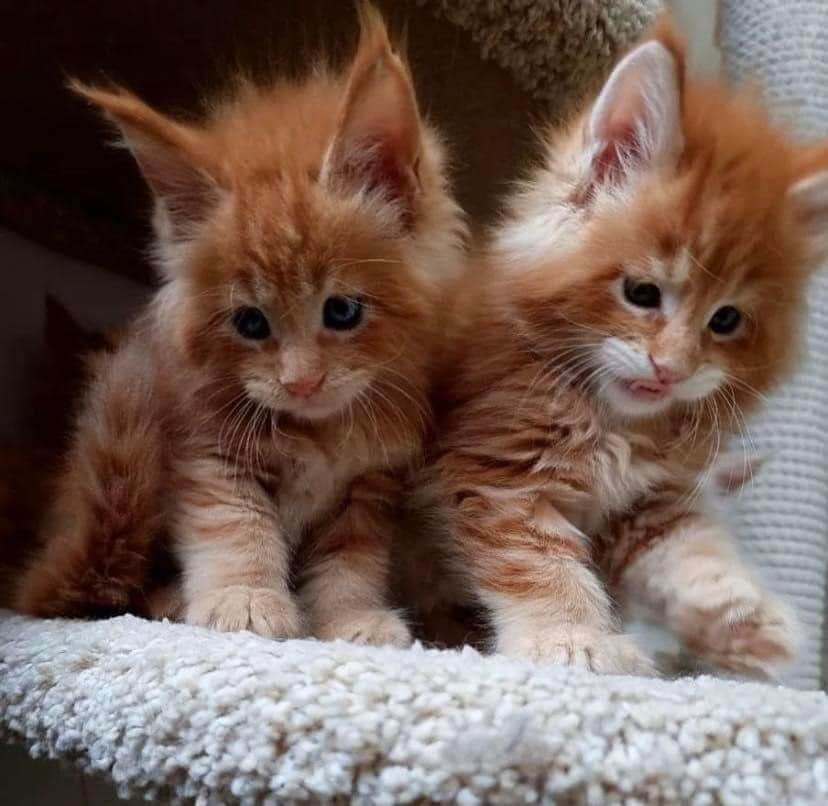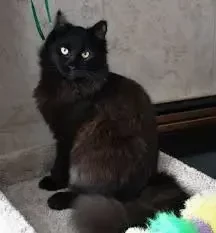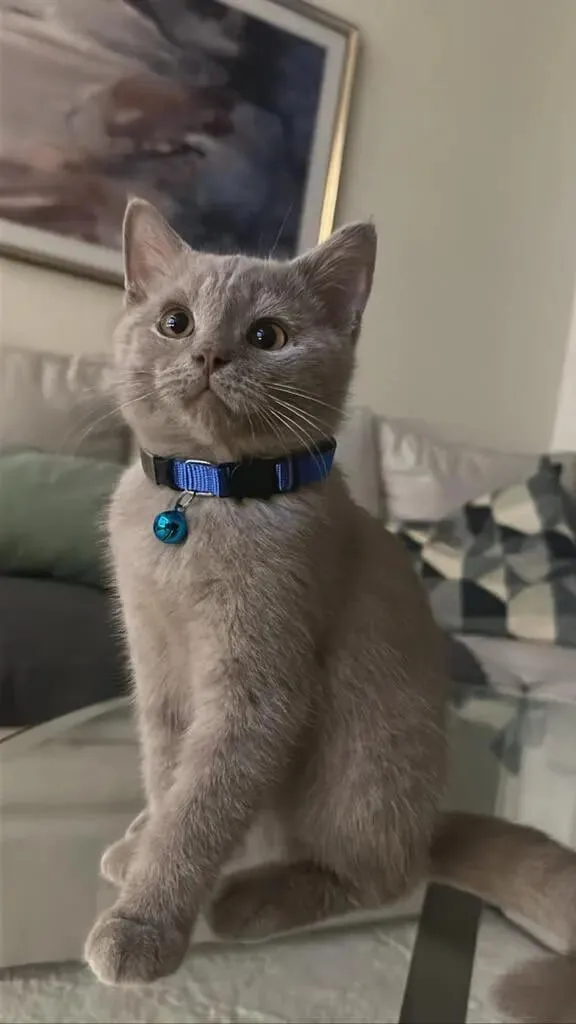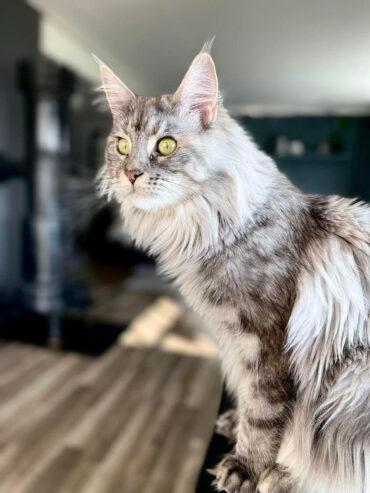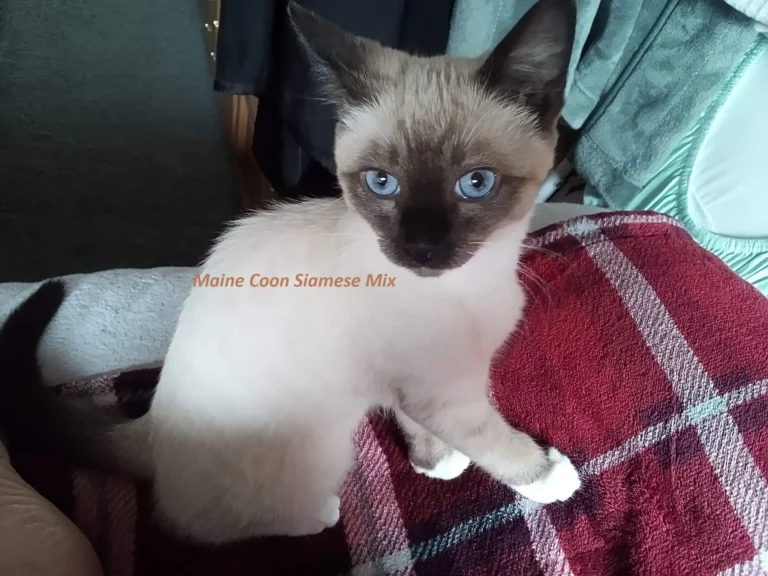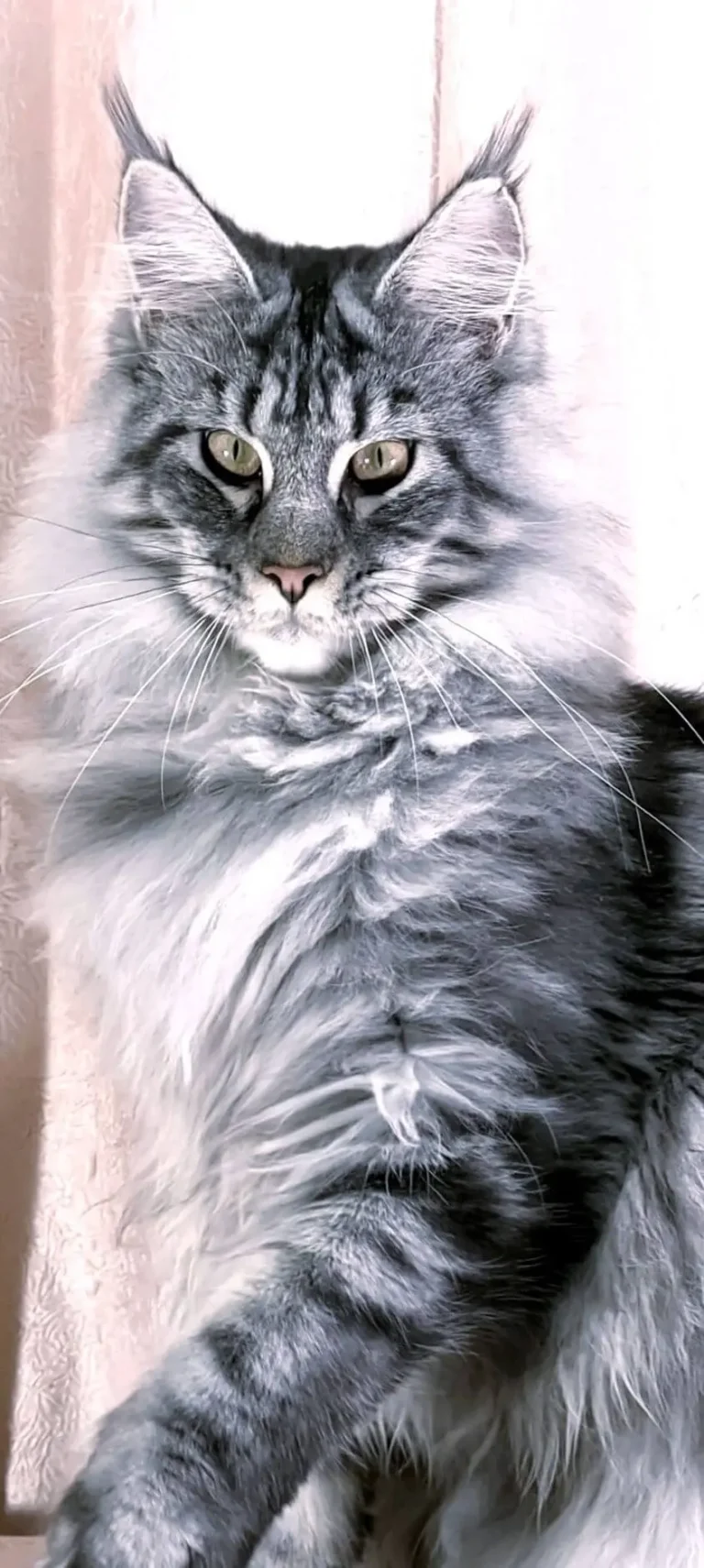Orange Maine Coon: Everything You Need To Know!
Orange Maine Coon cats also known as red or ginger Maine Coon, are large, unique in color, eye-catching, furry, and most beautiful in the Maine Coon Colouring family. They are the best among all colorings. They are the cutest and most friendly pets and are easily available for adaptation.
After a long research on these cats by the Cat Fanciers Association (CFA) the color of the orange maine coon is red and it is also called “Ginger Maine Coon” The size of an Orange Maine coon is between 20 to 30 pounds. Female orange maine coons are rare than males. About 80% are male maine coons in red color and the rest are females. For more details on this stunning enormous orange cat and a step-by-step tutorial on how to adapt it, see our article. Also, learn about its nature and personality.

| Normal Weight | 7-12 kg |
| Height in Inches | 10-16 Inches |
| Life-Span | About 10-15 years |
| Other Name | ginger Maine Coons |
| Intelligence level | Highest than other colored Maine coons |
Orange Maine Coon Male Vs Female Sizes:
Maine coons are the largest domestic cats in terms of weight and size.
| Orange Male | Orange Female | |
| Weight | ||
It is well known that Maine Coons develop quite slowly; frequently, they don’t reach their full size until they are between 3 and 4 years old. Since the majority of other cat breeds mature in just two years, this makes them unusual in the cat world. Avoid overfeeding your cat when they don’t seem to have grown to typical Maine Coon sizes. It’s crucial to keep this in mind, you shouldn’t overfeed cats because obesity is frequently associated with this breed.
Color Classification:
Over the last few decades, Maine coons got the most popularity, due to their stunning thick fur, gentle personalities, and their large size and volume. The coat of an Orange Maine Coon will be characterized by shades of orange, ranging from pale apricot to deep reddish-orange. It can be medium to long in length, with a dense, water-resistant topcoat and a soft, thick undercoat. They are classified into five types.
Red Tabby Maine Coon:
This is one of the most common variations of Maine Coon cats. Red tabby have a reddish-orange base coat with distinct darker stripes (tabby markings) running along their bodies. The tabby pattern can be classic, mackerel, or spotted.
Solid Orange Maine Coon:
Some Maine Coons may have a solid orange or red coat without any specific markings or patterns. These cats have a uniform color throughout their bodies, giving them a striking and vibrant appearance.
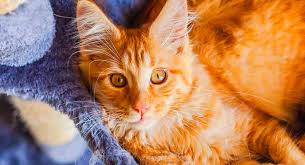
Tortoiseshell (Calico) Maine Coon:
Tortoiseshell Maine Coons have a mix of orange and black (or sometimes cream) colors in their coats. These patches are often distributed randomly, creating a beautiful mosaic effect.
Torbie Maine Coon:
A combination of tabby and tortoiseshell patterns, torbie Maine Coons display both the tabby stripes and the tortoiseshell patches in their orange-red coat.
Orange and White Maine Coon:
Some Maine Coons may have a combination of orange and white colors in their coats. These cats typically have large patches of white with orange areas.
Despite having five distinct variations, there are some variations of the “Red Tabby,” including the “Solid Red,” whose contrasting stripes are still present but have very similar coloration, giving it the appearance of being “solid.” All colors tend to appear and develop more as the cat gets older.
When considering whether a Maine Coon is the correct breed for you, you should keep in mind that its fur will always be medium to long in length and demand a lot of grooming.
Also, Read About Black Maine Coons.
How They Are Produced? (Genetically)
Orange Maine Coons are the most beautiful In the feline world. Orange kittens are typically the result of a specific combination of genetics. The orange color in cats is due to a gene called the “orange” or “O” gene, which determines the production of a pigment called pheomelanin. Here’s a basic overview of how orange kittens are produced:
The orange color is carried on the X chromosome. Female cats have two X chromosomes (XX), while male cats have one X and one Y chromosome (XY). The orange gene is dominant, meaning if a cat has one copy of the gene (Xo), it will display the orange color. However, if a cat has two copies of the gene (XoXo), it won’t be “extra orange”; it’ll still be orange.
Are Female Orange Maine Coons Rare than Male?
Since Maine Coons are a popular breed, you might not have a choice as to whether you want a male or female Orange Maine Coon. Everything will rely on the color and genetics of the parent cat, the number of kittens, and the color and sex of each individual kitten!
If you’re certain that you want a female Orange Maine Coon, you might need to wait a little longer or find several breeders since Red or Orange Maine Coons are frequently male.
Since males Maine Coons have only one X chromosome, if they inherit the orange gene, they will be orange. This is why many orange cats are male.
How Long Do Red/Orange Maine Coons Live?
They have an average life span of 10 to 15 years, although some can live longer with proper care and a healthy lifestyle. They are known as the largest cats in terms of size but they have not the largest life span. But still, these felines are very healthy and fit.
Red Maine Coon Health Issues:
They usually have no diseases if they take a healthy, balanced diet and exercise. But still, they face some kinds of diseases that veterinary doctors can cure. These health issues are:
- Hip Dysplasia:
- Maine Coons are a large breed, and they can be prone to hip dysplasia, a genetic condition where the hip joint doesn’t develop properly, leading to arthritis and pain.
- Hypertrophic Cardiomyopathy (HCM):
- This is a common heart condition in cats, including Maine Coons. It involves the thickening of the heart muscle, which can lead to heart failure if not managed properly.
- Spinal Muscular Atrophy (SMA):
- Maine Coons can carry a gene that causes spinal muscular atrophy, a neurological disorder that affects the muscles, leading to weakness and difficulties in movement.
- Polycystic Kidney Disease (PKD):
- PKD is a genetic disorder that causes fluid-filled cysts to develop in the kidneys, potentially leading to kidney failure.
- Dental Issues:
- Maine Coons, like many breeds, might be prone to dental problems such as gingivitis and periodontal disease if dental care is neglected.
- Obesity:
- Due to their large size and potential for overeating, Maine Coons can be at a higher risk of obesity. Obesity can lead to various health issues, including diabetes and joint problems.
- Grooming and Hairballs:
- Maine Coons have a long, thick coat that requires regular grooming to prevent matting and hairballs.
- Gastrointestinal Issues:
- Some Maine Coons might be sensitive to certain foods or have gastrointestinal issues such as irritable bowel syndrome.
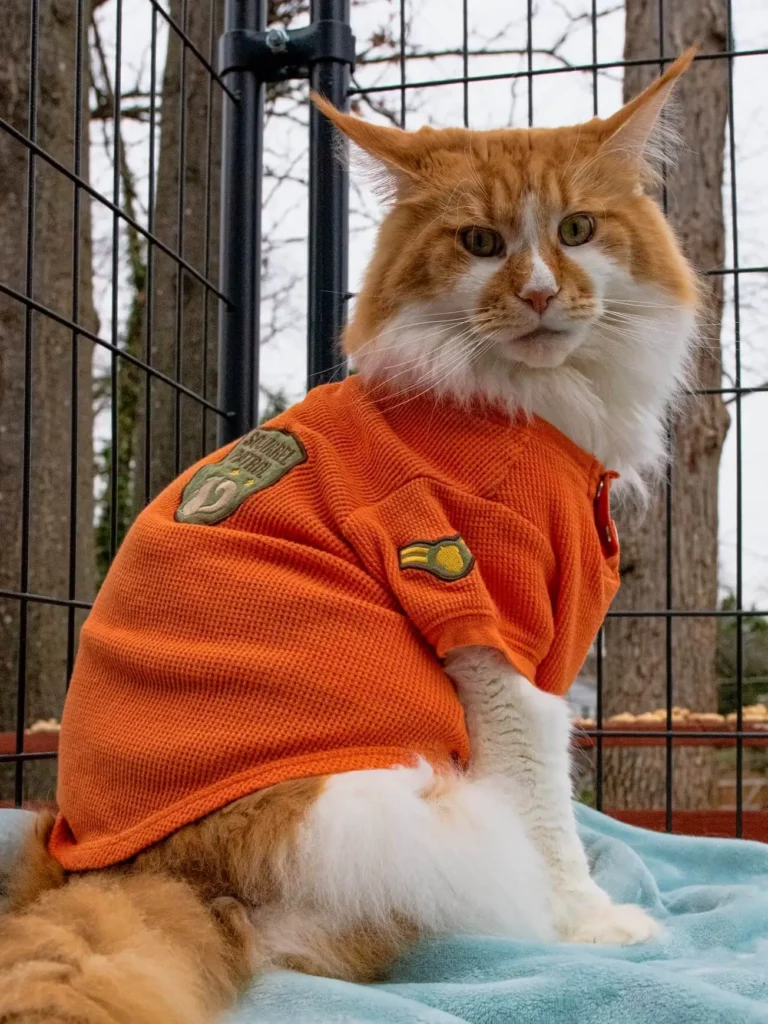
It’s important to note that not all Maine Coons, will necessarily develop these health issues. Responsible breeding practices, regular veterinary care, proper nutrition, exercise, and providing a safe and enriching environment can help minimize the risks of these health concerns and ensure your cat’s overall well-being.
Red/Orange Maine Coon Origin:
They are the most beautiful breed known for their large size, friendly nature, and stunning orange-colored fur. There are many Myths and stories about their breed origin. Some of these Myths are:
Seafaring Origins:
One popular theory suggests that these cats are descendants of longhaired cats brought to America by seafaring individuals. It is believed that these cats were companions on ships, where they helped control the rodent population. When the ships arrived in New England ports, the cats disembarked and bred with the local feline population, resulting in the development of the Maine Coon breed.
Viking Ancestry:
Another theory speculates that ginger or orange Maine Coon cats have Viking ancestry. According to this theory, Norse Vikings, during their exploration of North America around the 11th century, brought longhaired cats with them. These cats then interbred with the local short-haired cats, leading to the creation of the Maine Coon breed.
Native American Origins:
Some believe that the orange Maine Coon cats have indigenous origins and were present in the region before the arrival of European settlers. According to this theory, the cats’ ancestors were longhaired cats that already inhabited the area, and they adapted to the harsh New England climate over time.

In the 1950s, a small group of dedicated breeders worked to revive and promote the Maine Coon breed. They established breed standards and focused on preserving the breed’s unique characteristics, including its striking orange coat. These efforts paid off, and by the 1980s, Maine Coons had regained their popularity and were recognized as an official breed by various cat registries.
Personality and Traits
These orange cats are friendly and social, They enjoy interactive play and their owner’s company.
But somehow they are different from other Maine Coons due to their lonely nature. They also love to be alone and enjoy their own company, so Owners should not be worried if they have to go to some Important work and they have to leave their cat.
Before bringing them home, get familiar with the distinct characteristics of these orange cats related to their personality and traits explained below :
Dogs of the Cat worlds:
These are typically the largest in size of other cat breeds so they are known as the ‘dog of the cat world’.They have some other similar traits like in dogs.
Maine Coon cats are known for their large size compared to other domestic cat breeds. On average, a fully grown Maine Coon cat can weigh between 10 to 25 pounds (4.5 to 11.3 kilograms) and can measure around 10 to 16 inches (25 to 41 centimeters) in height at the shoulders. Their length, excluding the tail, can range from 18 to 40 inches (46 to 102 centimeters), depending on the individual cat.
Slow Growth Rate:
They have usually slow growth rate than other cats. It is well known that Maine Coons develop quite slowly; frequently, they don’t reach their full size until they are between 3 and 4 years old. Since the majority of other cat breeds mature in just two years, this makes them unusual in the cat world.
Do avoid overfeeding your Maine Coon when they don’t seem to have grown to typical Maine Coon sizes, it’s crucial to keep this in mind. You shouldn’t overfeed Maine Coon cats because obesity is frequently associated with this breed.
Intelligent Nature:
These cats are brilliant and curious creatures. You will be shocked to see their intelligence level, and they are also quick learners, They quickly learn and pick things which makes them able to train. Because they learn things quickly. So, people used to train them so they give them the high price of sale.
Live in the Family:
These breeds love to live in a family as they are sociable and love human company. they enjoy their owner’s and other family members’ company, but when a stranger comes to their place Maine coons take time to understand them and after some time they act normally.
In the below video, you will see some facts and personality traits of these beautiful coloring felines.
Vocalization:
They are not excessively talkative like some other breeds, But they try to explain their words in a so cute way like a sound of a bird. Maine Coons are known to communicate with their owners through various chirps, trills, and meows. They may get alone by owners if they have to go for some important work, but getting alone for a longer period makes them bored.
Living Environment:
Maine Coons are generally adaptable to different living environments, including apartments, as long as they receive enough mental and physical stimulation. Only they want love and affection from their owners.
Grooming:
These breeds need extra grooming to look beautiful and healthy. Due to their semi-long fur, Maine Coons require regular grooming to prevent matting and reduce shedding. Routine brushing will help keep their coat healthy and reduce hairballs. In grooming, the first thing is bathing once a month or after six weeks. All cleaning essentials should be there like hair brushes, nail trimmers, towels, Cat bath soap, and cat shampoo.
Like dogs, they can be trained for some super actions, Like how to shake hands, How to eat food, and how to entertain others. etc
Exercises:
These cats need proper exercise to be healthy and active. If this cat is an outdoor cat so there is no need to worry about exercise, it will have more fun and activities will be available. But if the cat is indoors The owners must arrange some playful activities, bring toys for them or play some games like hide and seek their food. The only purpose is to indulge them in activities so they don’t go towards obesity.
Where to buy a Maine coon cat? Things to Consider:
It’s important to note that individual cats may vary in temperament and appearance even within the same breed, so these characteristics are generalizations and not absolutes. If you are considering getting an Orange Maine Coon or any other cat, it’s always best to meet and interact with the specific cat first to ensure they will be a good fit for your home and lifestyle.
Research For Registered Breeders:
Make sure that the breeder should be registered with recognized cat breeding associations. If you have decided to buy a Maine coon with orange color, there must be proper research on these breeds. There are reputable and respected breeders in the town. They provide all pros and cons of this bread and recommend what Maine coon is good for you and your home. So do not be so hurry in to buy them from the breeder because it takes time to know whether the cat is orange or some other color, Also we can’t judge its gender. So, confidently you can trust these registered breeders about any health and vaccination issues.
In the United States (The Cat Fanciers Association) can provide a complete list of your local registered cat breeders. While in the United Kingdom, You can ask to find registered breeders near you through the official website of Governing Board Of The Cat Fancy (the UK’s Premier Registration Body).
Facebook:
Facebook is a very common place for adopting kittens, where you can find pages and links of Maine coon cats. These are mostly authentic and you can simply rely on these links and pages but on the other hand, you should do all safety measures before buying or sending online money. It will be safe side for you to properly investigate these online breeders. I Bought my orange kitten from this Facebook group.

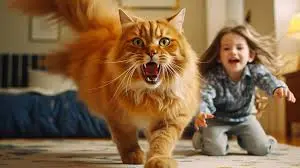
Orange Maine Coon Price:
Make sure that your budget is according to Maine Coon, because it is very costly and requires other facilities also like health, nutrition, and toys for playing. etc Most orange Maine coon’s average price is between 1000$ and to 2500$ as it does depend on the coloring.
Pet Insurance:
After purchasing Maine coon another step is pet insurance in case of any mishap.
Lifestyle Compatibility:
Also Assess that Maine Coon’s which you are going to buy is playful, sociable, and affectionate and aligns with your lifestyle and your living standards.
Male vs Female:
Since Maine Coons are a popular breed, you might not have a choice as to whether you want a male or female Orange Maine Coon. Everything will rely on the color and genetics of the parent cat, the number of kittens, and the color and sex of each individual kitten!
If you’re certain that you want a female Orange Maine Coon, you might need to wait a little longer or find several breeders since Red or Orange Maine Coons are frequently male.
Conclusion:
So, are huge in size, distinctive, furry attractive, and the most beautiful breed in the Maine coons family. They are very friendly but they also enjoy their own company when they are alone and the owners are not at home. They have five different classifications depending on the shades of orange. They are very intelligent and they love to play.
Mostly in orange colour male-maine coons are available and orange female maine coons are very rare. These breeds need extra grooming to look beautiful and healthy. They face some diseases like obesity and Hip Dysplasia which can be cured and treated. Proper research must be done for registered breeders if adopting mine coons.
